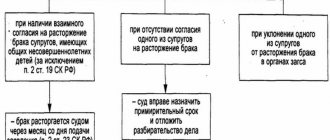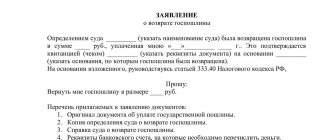14
What should a woman do if her husband was sentenced to a long prison term? There are two options: wait patiently for his return, hoping for the best, or try to establish a new life. But what to do when the decision to end the marriage relationship has been made, but the spouse is far away and categorically objects to the divorce?
The law provides for the possibility of dissolving a marriage using a simplified procedure, as a result of which the wife will not have to seek a divorce through a lengthy court procedure.
Receiving a copy of the judgment
In order to apply to the registry office, you must submit a certified copy of the court verdict that has entered into legal force.
To do this, you must apply to the court that convicted your spouse to issue a copy of the verdict, in which you indicate:
- Full name and place of residence of the applicant;
- details of the case in which the verdict was passed;
- reference to the need to obtain a sentence.
The application must be accompanied by a copy of the marriage certificate or a certificate from the registry office about the marriage relationship with the convicted person.
Expert opinion
Stanislav Evseev
Lawyer. Experience 12 years. Specialization: civil, family, inheritance law.
To divorce a prisoner, you only need to receive a copy of the judgment that has entered into force. The court verdict comes into force after 10 days from the date of delivery, unless it has been appealed.
If the convicted person appeals, the document comes into force after its consideration by a higher court and provided that the sentence has not been overturned.
If a verdict is refused, you can always contact the expert lawyers on our website for a free online consultation.
Lawyer's answers to frequently asked questions
How to get a divorce if there is no verdict?
The key condition for unilateral termination is the presence of a verdict. Until he gains strength, he cannot contact the registry office.
Is it possible to get a divorce if the marriage is registered after the husband’s conviction?
Yes, in general order. A simplified procedure is not available. If there are common children, the claim is filed in court.
Can a convicted husband refuse a divorce?
The simplified procedure does not provide such an opportunity; the opinion of the spouse is not taken into account. In general, consent, on the contrary, is mandatory.
How to divorce a convicted person if you have small children under 3 years old?
The age of the child is not important, the main thing is a conviction for a term of more than 3 years and the submission of a certified copy of the verdict to the registry office. In addition, child support is collected from him as a share of his income, since those convicted in a penal colony often work and receive a salary. A conviction does not relieve you of child support obligations.
Is it possible to divorce a convicted husband and deprive him of parental rights?
A man's conviction is not grounds for deprivation of parental rights. This is possible in case of evasion of payment of alimony, abuse of one’s rights, abuse of children and other cases specified in Art. 69 RF IC. An imprisoned parent has the right to see the child while serving his sentence and after release.
State duty
Divorce with a prisoner sentenced to imprisonment for more than 3 years is the “cheapest” procedure compared to other methods of divorce.
The state fee for a divorce from a married spouse is 350 rubles, which is established by clause 1 of Art. 333.26 Tax Code of the Russian Federation. The fee is paid only by the applicant when submitting a corresponding application to the registry office. Exact details and a sample receipt must be obtained from the territorial civil registry office at the place of divorce.
Payment is made at any bank branch, however, depending on the payment operator, the total amount may be slightly increased due to the bank's commission.
Who has the right to initiate?
Both parties have the right to take the initiative in dissolving the marriage. A husband in prison can initiate:
- MARRIAGE REGISTRY. The consent of the wife and the absence of common children will be required. The convicted person fills out his part of the application and has it certified by a notary. He travels to the IR for a fee.
- Court. If there is no permission from the wife or common children, a claim is filed by the legal representative. The procedure takes from 1 to 6 months depending on the circumstances. Based on the results, a decision is drawn up that comes into force in a month. The representative submits documents to the registry office to obtain a certificate.
A man has no right to initiate a divorce during his wife’s pregnancy or within a year after the birth of a child in the absence of her consent.
How to file for divorce unilaterally?
How to apply for divorce online through State Services? Step-by-step instruction
Application for divorce: how to do everything right
It seems that it might be easier to write a statement by hand and take it to the registry office.
In fact, even at this stage you can make a mistake and significantly delay the divorce.
Where to carry
The application is submitted to the civil registry office at the place of registration of the marriage relationship or at the place of residence of the applicant.
The applicant has the right to choose the place to apply for divorce, based on his own preferences - which of the registry offices listed above is more convenient for him to apply to.
How to fill
To divorce an imprisoned husband, application form No. 11 is used, the form of which can be obtained from the registry office or downloaded from our website.
Important! The application form can be filled out not only in the presence of a registry office employee. At a free consultation with our lawyers, you will be presented with an approximate sample of this document, which you can fill out in a relaxed atmosphere.
Such an application must be submitted at the place of your registration or at the place of marriage registration.
If you decide to fill out the application form yourself, do not forget to indicate the following points:
- name of the territorial division of the civil registry office;
- applicant details;
- information about registered marriage;
- grounds for divorce from a prisoner (link to the sentence);
- request to end the marriage;
- list of attached documents.
Thus, in order to file a divorce, you need to verify the legal grounds (receive the verdict), fill out and submit an application to the registry office.
In most civil registry departments, it is currently not necessary to fill out form No. 9 yourself. The institution’s specialist independently enters data about the applicant and his spouse into the program and automatically generates an application, which only needs to be carefully checked and signed.
Through the court
Divorce from a spouse sentenced to less than three years of imprisonment is considered in court in compliance with the general rules of territorial jurisdiction, i.e. at his last place of residence before his conviction.
Claims for divorce can also be brought to the court at the place of residence of the plaintiff in cases where there is a minor with him or, for health reasons, it is difficult for the plaintiff to travel to the defendant’s place of residence.
Divorce cases, if there is no dispute between the spouses about children, are under the jurisdiction of a magistrate. Divorce in this case occurs on a general basis. The state duty will be 600 rubles.
After submitting the application, all documents related to the divorce case will be sent to the colony. If the husband and wives are ready to agree to a divorce, then this can be confirmed by an appropriate petition. The document is certified by the head of the colony. In this case, most likely, the procedure will go much faster.
In cases where the term of imprisonment is less than 3 years, the lack of consent of the convicted spouse does not particularly affect the final decision of the court. The marriage will still be dissolved.
Step-by-step instructions for divorcing a convicted person
To summarize the material presented, the process of divorcing a prisoner can be outlined in the following step-by-step instructions:
- Making a decision to end a family relationship.
- Obtaining a certified copy of the verdict from the court.
- Filling out the application form to file for divorce.
- Submission to the registry office of the necessary documents and state duty receipts.
- Obtaining a certificate of termination of marriage.
The final document of the divorce procedure will be the receipt of a certificate. To do this, the wife needs to go after 30 days to the same civil registry office where she submitted the documents.
The procedure for the registry office upon receipt of an application for divorce from a prisoner:
- Receipt of the application and its verification.
- Notifying the prisoner within three days of his wife's request for divorce.
- Providing a one-month period so that the husband can decide whether his surname will change and notify the court about this.
- State registration of divorce (in the presence of the applicant wife).
- Issuing a certificate of termination of marriage to the wife, notifying the husband of the divorce.
A divorce certificate is issued to the ex-husband upon release from prison. It is not sent by mail.
Divorce with a person in custody through the registry office
As a general rule, divorce in the registry office is carried out with the mutual consent of both spouses who do not have common minor children, on the basis of a jointly submitted application. In this case, special rules apply to a man or woman who is a suspect (accused) and is in a pre-trial detention center.
If there is mutual agreement, the marriage can be dissolved in the following way:
:
- The suspect (accused) turns to the administration of the pre-trial detention center with a request to provide a form for a joint application for divorce in the established form.
- With the permission of the person or body in charge of the criminal case, a notary is invited. In his presence, the suspect (accused) fills out his side of the document, and then the signature is certified by a notary.
- The administration of the pre-trial detention center transfers the application to the other spouse. State registration of divorce between spouses, one of whom is a suspect (accused) in the case and is in custody in a pre-trial detention center, takes place in the registry office serving the territory in which this institution is located.
Can a convicted person file for divorce?
A spouse serving a sentence in prison also has the right to demand a divorce.
Unlike the spouse who remains at large, there are no simplifications or relaxations provided for the spouse serving a prison sentence. You will have to file for divorce in the general manner.
Through the registry office
A convict who has decided to get a divorce and who has grounds for divorce through the registry office must send an application certified by the signature of the head of the colony to the department of the civil registry office.
Important! If the prisoner’s spouse agrees to divorce (and if the couple does not have minor children together), the divorce will take place within 1 month from the moment the civil registry office receives an application from the spouse serving a sentence.
Through the court
If there are objections from the spouse, the divorce procedure will take place through the Magistrates' Court in accordance with the general procedure.
The statement of claim, which the prisoner will need to send to the court, must also be certified by the heads of the correctional institution.
The fact of the presence of children in this case is not particularly important, since no one will decide the issue of leaving children with the prisoner.
In addition, if the spouse agrees to a divorce, and the imprisoned marriage partner is serving a sentence of more than three years, it will be more convenient for the spouse to file for divorce.
Is it possible to get a divorce if my husband is in prison?
To begin with, a correct and comprehensive assessment of what happened will be required. Understand yourself and think about how to live further. Filing for divorce if your husband is in prison is sometimes a reckless act.
After all, one citizen can be accused of robbery or deliberate assault, and another for accidentally hitting an old woman with a vehicle who grossly violated traffic rules, causing a serious accident with a fatal outcome.
In both cases, the culprit will face a prison sentence, however, the motives and situations are different.
It becomes clear that the wife’s moral position towards the “caretaker” is ambiguous. She must be aware of how not only her contacts with her ex-husband will develop in the future, but also with their common children, if they have any.
Therefore, she should decide whether it is possible to maintain a marriage with a convicted person in the future after his release? If not, then the legislator has provided 2 options for severing relations in this situation:
- By contacting the registry office.
- Judicially.
In the first case (it is also called simplified or administrative), a mandatory condition must take place: a court sentence has entered into force, condemning a person to imprisonment for a term of three or more years (clause 2 of Article 19 of the RF IC ). Then you can break family ties in the shortest possible time.
Against the background of despair and fear for her future, a woman has thoughts: what to do if, for example, there are minor children together?
In the case under consideration, this does not play a role, and an appeal to the court will not be required. In addition, there will be no need to ask the consent of the husband in prison for a divorce. The whole process will be resolved without problems and in a short period of time at the registry office.
Spouses will be divorced through the court if the husband received a sentence that is less than 3 years.
Typically, during the hearing, the judge will give time to think about this step. However, under such circumstances this is unlikely, since the husband is in MLS. It’s another matter if he has a lawyer, then he can insist on postponing the consideration of the divorce claim and perhaps the spouses will remain together.
Can a convicted person refuse a divorce?
In conditions where the prison term is three or more years - no, it cannot.
The law gives a marriage partner who remains at large the unconditional right to terminate family ties at his sole discretion. The position of the imprisoned spouse in this case does not matter.
However, if the prison term does not exceed 3 years, then the divorce will occur in accordance with the general procedure. The marriage will be dissolved exclusively in the magistrate's court in the event of disagreement with the termination of the relationship on the part of the spouse in prison.
In this case, the prisoner has the right to object to the divorce process, but the final decision will in any case be made by the magistrates' court.
Important! Practice shows that courts most often side with wives whose husbands are serving time in prison for intentional crimes. With all this, the court cannot refuse the claim, even if it considers that the spouse’s decision to end the marriage was caused by difficult life circumstances and can be changed in the future.
Arbitrage practice
Precedents show that courts without any problems make decisions and confirm the fact of divorce from a person temporarily deprived of liberty. There may be additional details related to the collection of alimony and division of property.
By the way, decisions on divorce from a convicted spouse are made not only by magistrates’ courts, but also by district courts. Moreover, the matter concerns not only the absence of children, but also disputes over property.
Here are a few examples to illustrate this. The legislation has not changed, so the decisions remain relevant.
When spouses do not live together for a long time
The magistrate of the judicial district of the Terengulsky district of the Ulyanovsk region accepted Sidorova’s claim against Muravyov for divorce. The plaintiff indicated that she has not lived with the defendant since 1990.
We recommend! How to file a unilateral divorce with children, without children and common property
Now she is in a relationship with another man and wants to start a family with him. In turn, Muravyov is in prison and is against divorce through the court and the registry office.
By decision of 09/08/2014 in case 2-597/2014 the claim was satisfied. The marriage between the spouses was terminated.
Divorce on the initiative of the convicted person
The Kiev District Court of Simferopol considered Litvinov’s claim against Malysheva. He asked to dissolve the marriage with his wife due to the lack of cohabitation and running a common household.
The plaintiff explained that he could not apply to the registry office because he was in prison. The defendant admitted the demands, citing the fact that she was unable to initiate the divorce procedure on her part due to her employment.
By decision of December 7, 2016 in case No. 2-8459/2016, the requirements were satisfied. In parallel, Malysheva was charged legal expenses for payment of state fees.
Divorce and collection of alimony from a convicted person
Ivanova turned to Shepelev with a claim for divorce and collection of child support in the amount of ¼ of the payer’s income. The statement states that since May 2021, the family has actually broken up; at the time of going to court, the defendant is serving a sentence of 2 years in prison in a general regime colony.
The Anadyr City Court of the Chukotka Autonomous Okrug, by decision dated July 30, 2019, in case 2-242/2019, partially satisfied the claim. He divorced the marriage and determined where his daughter should live with her mother.
As for alimony, the court did not agree with its collection as a percentage of income. The decision states that while in the correctional colony the defendant is not employed. Therefore, deductions are assigned in the form of a fixed sum of money equal to half the subsistence level for children established in the region.
Process Features
Having children
If the divorce occurs in a simplified manner through the registry office at the request of the wife, when the husband must serve more than 3 years in prison, then the fact that they have or do not have minor children does not play any role in the divorce process.
However, if the husband is sentenced to a term of less than three years or sentenced to another type of criminal punishment other than imprisonment, then if there are young children, the divorce must be carried out in court.
Is it possible to dissolve a marriage?
who was imprisoned
If the marriage relationship was registered at a time when one of the spouses or both spouses were in a correctional colony, regardless of the length of their imprisonment, then dissolution of family ties is possible only on the general grounds provided for by the Family Code. However, divorce in prison is also possible under a simplified procedure if the spouse, sentenced to imprisonment, committed another criminal offense in the colony, for which, by a court verdict, he was given an additional term of imprisonment exceeding three years.
Conditional sentences and terms of less than 3 years
Divorce in these cases is carried out on the general basis, which is discussed in Chapter 4 of the Family Code.
What to do if your wife is sitting
The law does not distinguish between a wife and husband when granting them the right to divorce unilaterally. Therefore, if your wife has been sentenced to imprisonment for more than three years, you can submit documents for the dissolution of marital relations with her in a simplified manner in accordance with the provisions of paragraph 2 of Article 19 of the Family Code.
In other cases, divorce is carried out through the registry office or in court according to general rules.
How can a prisoner get divorced?
The procedure for breaking a family union between a convicted person, who must be in prison because he was sentenced to imprisonment by a court, and the other spouse depends on whether they have a joint consent to the separation and whether there are disputes about children or property.
If there are no disagreements of any kind, and the spouses are ready to separate, then the dissolution of the marriage relationship occurs in the registry office according to the following algorithm:
- The convicted person must write a statement in form number 8, which is certified by the head of the colony, and sends it by mail to the address of the other spouse or gives the document to him during a meeting.
- The other spouse prepares his own copy of the application, pays a fee for both participants in the marriage union and brings to the registry office with the application the passports of both spouses and a certificate confirming the fact of marriage between them.
- A month later, the other spouse takes the originals of the divorce certificate and sends one of them in any available way to the convicted person. From this moment on, their marriage is considered dissolved.
In other cases, marital relations are terminated after the case is heard by a judicial authority. What are the features of a divorce action initiated by a prisoner?
- The prisoner needs to find a person who will represent him in government agencies and have the authority to receive official papers and pay fees. This person is issued a power of attorney on behalf of the convicted person, certified by the head of the correctional institution or a notary.
- Then a statement of claim is written to the court located at the place of registration of the other spouse, the state fee is paid through a representative and the claim is submitted to the court along with the required documents. In case of property disputes, documents substantiating the plaintiff’s claims to jointly acquired property are attached.
- If the court accepts the application and proceeds with it, then a time and day are set for the trial, at which a representative of the convicted person may be present in order to protect his interests and legal rights.
- If the plaintiff's demands for termination of the marriage are satisfied, the representative has the right to transfer the court's decision to the registry office and receive a certificate certifying the fact of termination of the marriage in the name of the convicted person. The corresponding stamp is placed in the passport only after serving a prison sentence.
- If the registry office refuses to hand over to the representative a certificate certifying the fact of termination of the marriage, he must request a written refusal to do so, so that in the event of a trial he will have evidence of violation of the law by the registry office employees. Usually, after such a requirement is presented, the certificate is issued without any questions asked.
The legislative framework
| Name of the normative act | What regulates |
| Family Code of Russia |
|
| Civil Procedure Code of Russia |
|
| Russian Tax Code |
|
If there are children
When a couple has common minor children, the court usually has to decide the issue of their place of residence and assign alimony. However, when one of the parents is in prison, the question of residence automatically disappears - they remain with the plaintiff. Even if the relatives of the convicted person want to challenge this decision and take the child for themselves, it will be very difficult to do so. Most likely, it will be necessary to raise the issue of deprivation or limitation of parental rights (if there are grounds for this), but a separate claim will be required.
This issue will not be considered as part of the divorce process. Therefore, usually the court only has to order alimony for minor children (if the plaintiff makes such a request).
Expert commentary
Shadrin Alexey
Lawyer
Typically, alimony is assigned in accordance with the RF IC in a fixed sum of money or as a share of income. If a spouse works in a colony, then he is paid a salary, from which funds can be withheld for the benefit of the child until the payer is released. Therefore, alimony is assigned as a share of income. The writ of execution will be sent to the colony administration. The money will be transferred to the details specified by the recipient.
Since the prisoner's income is small, the plaintiff may not raise the issue of alimony during the divorce process, but postpone it until the spouse is released.
Problems and nuances
In order for a wife to be able to take advantage of the “benefits” that allows her to divorce her husband who is in prison unilaterally through the registry office, if the spouse is imprisoned for a period of 3 years or more, a court verdict will be required (Article 34 of Federal Law No. 143). If the corresponding decision has not yet been made or has not entered into force, it will not be possible to dissolve the marriage on your own initiative. You will need to wait until the simplified scheme becomes legally available.
IMPORTANT
The convicted person will not be able to personally take part in the divorce. Article 77 of the Code of Criminal Procedure of the Russian Federation states that a person can only be shocked within the framework of a criminal case. The corresponding rule does not apply to civil proceedings.
Divorce in prison is possible. The legislation establishes a simplified scheme for dissolving a marriage with a convicted husband or wife. However, this method is only available if a number of conditions are met. If there are no grounds for the imminent termination of official relations through the registry office, you will have to act according to the standard scheme. A divorce from a convicted spouse will have to be filed through the court. The choice of court depends on the existence of disputes. The article details all the subtleties that will help you competently prepare for the process of divorcing a spouse in prison.
Comments Showing 0 of 0
Property division
The plaintiff may also raise the issue of dividing jointly acquired property. It is resolved in the usual manner, but due to the inability of the defendant to promptly respond to the arguments of the other side and defend his interests, the process may drag on. Therefore, if the prison term is short, it is sometimes advisable to wait until the end of the sentence and divide the property after it. This can be done within 3 years after the divorce (Article 38 of the RF IC).
Article 38 of the RF IC - Division of common property of spouses
- The division of the common property of the spouses can be made both during the marriage and after its dissolution at the request of any of the spouses, as well as in the event of a claim by a creditor to divide the common property of the spouses in order to foreclose on the share of one of the spouses in the common property of the spouses.
- The common property of the spouses can be divided between the spouses by their agreement. An agreement on the division of common property acquired by spouses during marriage must be notarized.
- In the event of a dispute, the division of the common property of the spouses, as well as the determination of the spouses' shares in this property, are carried out in court. When dividing the common property of spouses, the court, at the request of the spouses, determines what property is to be transferred to each of the spouses. If one of the spouses is transferred property the value of which exceeds the share due to him, the other spouse may be awarded appropriate monetary or other compensation.
- When dividing the common property of spouses, the court, at the request of the spouses, determines what property is to be transferred to each of the spouses. If one of the spouses is transferred property the value of which exceeds the share due to him, the other spouse may be awarded appropriate monetary or other compensation.
- Items acquired solely to meet the needs of minor children (clothing, shoes, school and sports supplies, musical instruments, children's library and others) are not subject to division and are transferred without compensation to the spouse with whom the children live. Contributions made by spouses at the expense of the spouses' common property in the name of their common minor children are considered to belong to these children and are not taken into account when dividing the spouses' common property.
- In the case of division of the common property of the spouses during the marriage, that part of the common property of the spouses that was not divided, as well as the property acquired by the spouses during the subsequent marriage, constitute their joint property.
- A three-year statute of limitations applies to the claims of spouses for the division of common property of spouses whose marriage is dissolved.
It should be taken into account that if a prisoner has a share in real estate, it is almost impossible to deprive him of the right to it without his consent. It remains the same even if the apartment is sold to third parties.
Normative base
Divorce from a convicted person is regulated by the same legal acts that apply if a marriage is dissolved by a free couple. First of all, you need to know the provisions of the RF IC. The rules regarding divorce are enshrined in the following articles:
- Art. 19. Defines the specifics of terminating family relationships through the civil registry office, and also records a list of exceptions, in the presence of which, a divorce is possible through the registry office without the presence of a spouse.
- Art. 21. Determines cases in which a visit to court is indispensable.
- Art. 22. Reflects the norms, taking into account which a divorce occurs through the court, if the husband or wife wants to preserve family legal relations and refuses to consent to the dissolution of the marriage.
- Art. 23. Determines the specifics of divorce through the court if both spouses understand that it is impossible to save the marriage.
- Article 24. Fixes a list of issues that can be resolved during the divorce process through the court.
Separately, when divorcing a spouse in prison, it is worth paying attention to Federal Law No. 143 of November 15, 1997. The regulatory legal act reflects the rules for obtaining a divorce certificate, records interaction with the registry office, and sets the deadlines for the implementation of legally significant actions in the authority.
If a divorce from a spouse in prison occurs through the court, a married couple cannot do without knowledge of the rules of the Code of Civil Procedure of the Russian Federation . In particular, you need to study the following articles:
- Art. 131. Determines the rules for filling out a claim, fixes the form of the document, reflects the list of information that needs to be entered into the document form.
- Art. 132. Taking into account the requirements of the legal act, it is necessary to draw up a list of appendices to the claim.
- Art. 133. Determines the time frame for consideration of the claim and acceptance of the document for work.
- Art. 134. Determines the reasons for refusal to consider a claim for divorce.
It is necessary to file a divorce in prison and prepare documentation, taking into account all current legislation. This will minimize the risk of errors.










